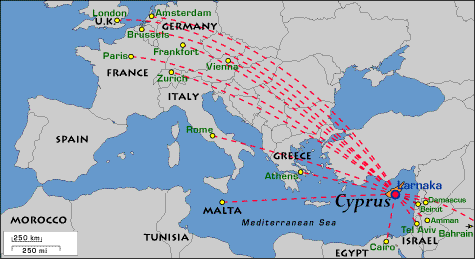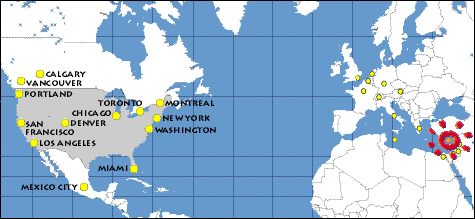
Cyprus is located in the Eastern Mediterranean sea, and can be reached by several major international airlines from European or Middle East gateway cities. From North America, travelers can break up the journey in the European city of their choice, or elect to keep connection time to a minimum. Popular gateways include London, Paris, Amsterdam, Athens, Frankfurt, Zurich, Helsinki, Rome etc. From Asia, travelers can stop at Dubai, Haifa, Cairo, Beirut etc. Cyprus Airways provides regular daily flights from many major European and Middle Eastern gateways to the airports of Larnaca or Paphos in Cyprus. Legal Points of Entry: Larnaca Airport is the most popular point of entry in Cyprus and is located closer to the workshop. Paphos Airport is located slightly further away. Other legal points of entry into the Republic of Cyprus are the ports of Larnaca, Limassol, Latsi and Pafos, which are situated in the area under the effective control of the Government of the Republic of Cyprus. Entry into the territory of the Republic of Cyprus via any other airport or port on which the Government of the Republic does not exercise effective control (Turkish occupied areas) is illegal.
In Cyprus there are two International airports: Larnaca and Pafos. Most travellers reach Cyprus through the Larnaca International Airport. Flight time from London to Larnaca is 4.5 hours; from Frankfurt, 3.5 hours; from Athens, 1 hour and 35 minutes.

There are daily connections to London (BA, Cyprus Airways), Amsterdam (KLM/CA), Athens (CA, Olympic), Frankfurt (LH), Tel Aviv (CA, ElAl), Rome or Milan (CA/Alitalia), Vienna (Austrian), and frequent connections to Paris, Zurich, Moscow, etc.

Flight times are presented in the following table:
Flight Times to Cyprus |
Athens 1hr 35min |
Amsterdam 4hrs30 min |
Cairo 1hr15min |
Frankfurt 3hrs30min |
London 5hrs |
Moscow 3hrs30min |
New York 11 hours |
Paris 4hrs |
Tel Aviv 45min |
Thessaloniki 2hrs |
Vienna 3hrs |
The national carrier of Cyprus is Cyprus Airways:
From Larnaca airport there are shuttle bus services to transfer you to the station in Limassol and from there you can take a taxi
to your hotel of residence. The cost of the bus is 8.00 Euro from Larnaca Airport.
You may view the timetables of the airport shuttle bus services
here. Click here for a direct link to the timetable. Please note that if you take this shuttle bus, you should get off at the
first stop 'Agios Athanasios', which is closer to the hotels of the
conference. From there the easiest way to get to any of the hotels is to
get a taxi. Informing the bus driver that a taxi is needed at drop off, will ensure that a taxi will be waiting at Agios Athanasios.
Further information regarding intercity public transport connecting
the cities (not the airports) of Cyprus can be found
here.
The bus timetable from the city of Larnaca to Limassol can be found
here.
This bus goes from the costal road when it reaches Limassol and passes
from the hotels of the conference and stops at them on requests. So another way to get to the hotels in Limassol from Larnaca airport is to get a taxi from Larnaca airport to the city of Larnaca (Larnaca Central Station) and take a bus from there to the hotels in Limassol.
In addition, taxis
are always available at the Airport for your transfer to Limassol. The cost for a 4-seated taxi from Larnaka Airport to Limassol
is approximately 60.00 Euro per taxi per way. Please note the prices
for taxis vary depending on the time of arrival.
Cars can be rented at the airport from most international rental firms at a cost starting around 25 Euro/day. However, as in most former UK possessions, driving in Cyprus is on the left side of the road, using right-wheeled vehicles, and is not recommended for drivers unfamiliar with this practice.

Cyprus, an island of legends that basks year-round in the light of the warm Mediterranean sun. A historic island, the third largest in the Mediterranean where modern travelers retrace the footsteps of figures as diverse as St. Paul, Alexander the Great and Leonardo da Vinci.
Today Cyprus is a modern country that effortlessly marries European culture with ancient enchantment. You will discover a compact world of alluring beaches and fragrant mountain peaks, vineyards studded with olive trees and ancient ruins that stir the imagination, citrus groves and old stone villages.
The people of Cyprus owe their individuality and warmth to the fact that they are the product of an amazingly colorful history. This sun-drenched island has been at the crossroads of world events for centuries. Roman, Byzantine, Greek and British influences (to name just a few) have all had a bearing on life in Cyprus. Perhaps that's why Cypriots have a special knack of making visitors feel at home as soon as they step off the plane or ship. That warm welcome, plus the unhurried pace of daily life, makes Cyprus an instant favorite of anyone who goes there. However, Cypriots managed to positively and creatively assimilate the foreign influences from all the invaders and to maintain unchanged the Greek language and the cultural heritage.
In 1974 Turkey has invaded Cyprus and occupied the northern part of the Island. More than 35 years after the invasion by Turkish troops, Cyprus still remains the only divided country in Europe. However, Cyprus can be proud of all its important achievements, the greatest of all being its accession to the European Union.
With a modernized economy Cyprus is in position to be part of a new peaceful and prosperous Europe in which Greek and Turkish Cypriots together will be able to utilise the vast opportunities that membership offers. The challenge facing Cyprus is to ensure that both communities have a role to play in the future of the country. A viable and functional solution to the Cyprus problem will ensure human rights for all the Cypriot European citizens and this will guarantee security and well being.
Weather
Typically, summers in Cyprus are quite hot. Temperatures in
Nicosia in Janurary can be are about 24-30 C. For more information
on cypriot weather is available online.
Currency
The Cyprus unit of currency is the Euro €
Insurance
It is recommended that participants arrange insurance for
medical expenses, loss and accidents occurring during the
conference. The organizers cannot be held responsible for
any losses, damages or injuries.
Visas
Please note that participants from the USA, from Australia,
from Canada and from Western Europe do not need a passport
visa to travel to Cyprus. Participants from Syria, Jordan,
the Arab Gulf (Aman, Quatar, Bahrain, Kuwait, etc) and countries
of the former Soviet Union can obtain a visa upon arrival
at Larnaca Airport after presenting a letter of invitation
(to be issued by the conference secretariat), a valid
passport, a return ticket to and from Cyprus and information
on local accommodation. If a visa is required for your country,
then please visit the Cyprus Ministry of Foreign Affairs
for further detailed information
Voltage
Electricity in Cyprus is 240V.
Credit
Cards
All major credit cards are accepted widely, but not everywhere.
If in doubt, ask in advance.
Traveller's
Cheques
It is advisable to take some cash with you for the first few
days in Cyprus. Traveller's cheques are a safe alternative
to cash and are handy if you do not have a credit card.
Banking Hours
Banks are open on week days between 8:30 and 13:00 and on
Mondays 15:15 - 16:45.
Links
Cyprus Tourism Organization
The World of Cyprus
Cyprus News Agency
Limassol Municipality
Press
and Information Office, Republic of Cyprus.
Cyprus Mail (daily
newspaper in English).
Cyprus Weekly
(weekly newspaper in English).
Phileleftheros Newspaper
(in greek).